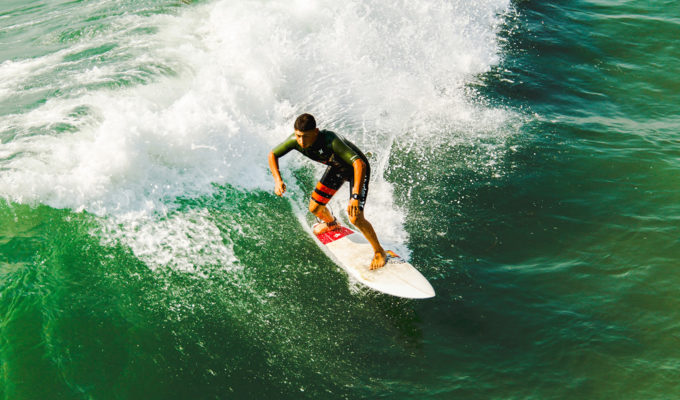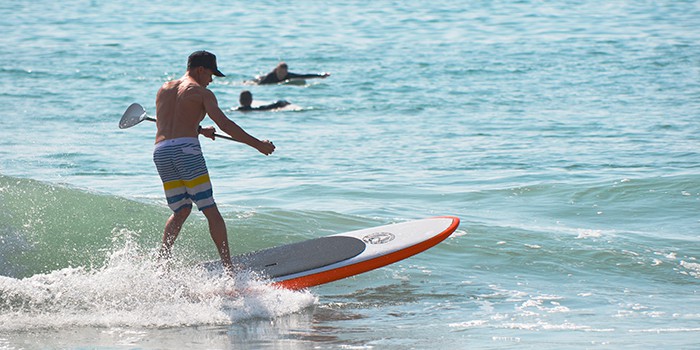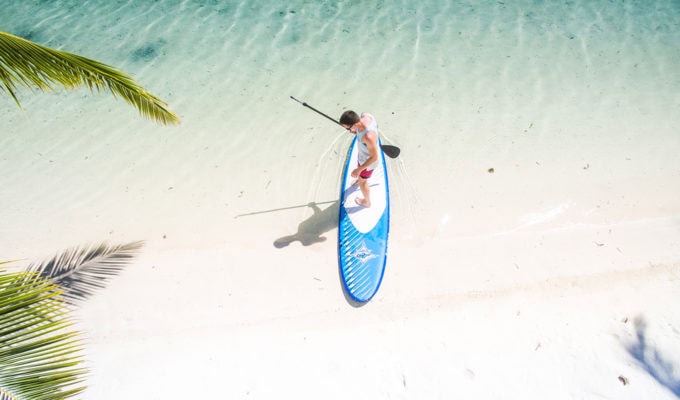What’s the Difference Between Paddle Boarding and Surfing?
One of the most significant differences between paddle boarding and surfing is the paddle boarder uses a paddle to propel themselves forward and doesn’t need waves.
A surfer always requires some surf to ride.
Otherwise, they would spend all their time paddling around only using their arms.
You won’t often see a surfer floating around on flat water, but you will see a lot of SUPs cruising on the ocean, lakes, or rivers.
See Also: Best Inflatable Paddle Boards (ISUP) for Beginners
What Is Paddle Board Surfing?
Paddle board surfing is a real thing and can be easier at times than traditional surfing.
Surfing is all about timing, getting yourself in the perfect position at the perfect time to start riding a wave.
When paddle board surfing it’s easier to catch a wave because you can paddle while standing. Giving you a larger window to get into the right position.
The problem with them is they are harder to maneuver and are only good for small to medium-sized waves.
See Also: Inflatable Paddle Boards vs. Solid (Hard) Paddle Boards
Epoxy paddle boards are made with the same materials as surfboards but are thicker and sometimes wider. They are the best kind of paddle board for surfing.
If you are going to be surfing a lot, try and buy a short, thin board with a long center fin and two smaller “side bite” fins.
Inflatable paddle boards can be used for surfing and perform well. A cool thing about them is they have a little more give than hard boards which can work to your advantage when hitting choppy water.
The main downside to them is they need to be thicker than hard boards.
The sides or rails of a surfboard are thin to stop the board from catching on the water and spinning out. They come in different thicknesses and shapes for performance and maneuverability.
Because ISUPs have to be a certain thickness to stay rigid, they are less customizable.
There are some cool ISUPs with a focus on surfing, click here to see our article on the best options, that can work well regardless of the rail problem.
Surfboard vs SUP vs ISUP
You might be asking yourself “why not use a surfboard for paddle boarding?”
The main reason is they are not nearly as stable as paddle boards and will be very difficult to use without falling off.
I’m not saying it’s impossible, but it would take a lot of balance work and practice.
If you’re having a hard time deciding between buying a traditional surfboard or a paddle board here are a few pros and cons.
See Also: Best Slim Inflatable Life Jackets (PFD)

Surfboard
PROS
- More maneuverable while riding waves
- Very customizable
- Often cheaper than paddle boards
- Can surf larger waves
- Can choose what kind of rail you want
CONS
- Can only be used for surfing
- Hard to store and transport
- Requires more technique
- Can scratch or dent

Epoxy SUP (Hard Paddle Boards)
PROS
- Can be used for many different activities
- The most stable kind of board on this list
- Gives you a bigger window to catch a wave
- Thinner rails than an ISUP
CONS
- Expensive
- Can scratch or dent
- More difficult to maneuver on a wave
- Hard to store and transport
- Only good for small to medium-sized waves

ISUP (Inflatable Stand Up Paddleboard)
PROS
- Very durable, they don’t get dents or scratch easy
- Easy to transport and store
- Can be used for many different activities
- More stable than a surfboard
CONS
- Have virtually no rail
- Less maneuverable than an epoxy sup
- Expensive
- Only good for small to medium-sized waves
- Not as customizable as surfboards or epoxy sups
If you’re interested in paddle boards for surfing, click here to read our post on the best ones.
For more information about how to surf with a stand up paddle board check out this Paddle Board Surfing 101 video.
Have any questions about surfboards vs stand up paddle boards? Leave a comment below.
